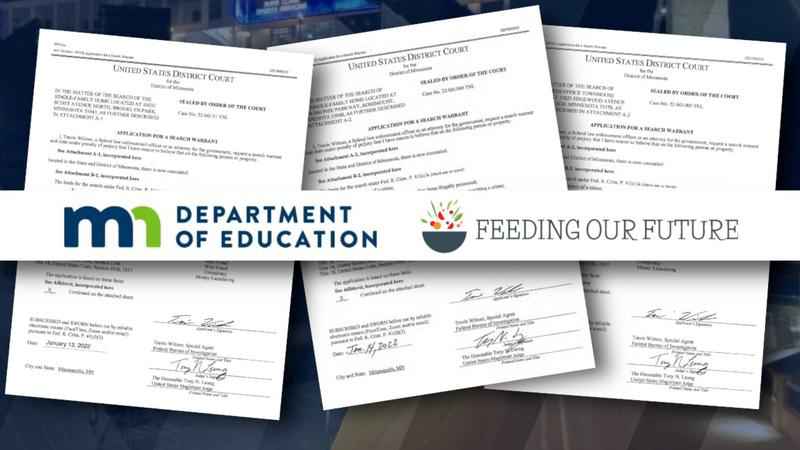Feds: Nonprofit stole millions of tax dollars meant to feed kids during pandemic
[anvplayer video=’5084896′ station=’998122′]
A Minnesota-based nonprofit organization that was supposed to help feed underprivileged children during the COVID-19 pandemic is now under federal investigation for allegedly spending millions of dollars in public money on cars, luxury items and lakefront properties, according to search warrants obtained by 5 INVESTIGATES.
Federal agents seized property Thursday from several locations associated with Feeding our Future. Court records show the organization received nearly $200 million last year in Federal Child Nutrition Funds through the U.S. Department of Agriculture.
A law enforcement source confirmed to 5 INVESTIGATES that no arrests have been made but the investigation is ongoing.
Voice messages and emails to Aimee Bock, the founder and executive director of Feeding our Future, were not immediately returned. No one answered the door at Bock’s home in Rosemount or at the office of Feeding our Future in Minneapolis on Friday.
The FBI started investigating the nonprofit last May after being tipped off by the Minnesota Department of Education — which oversees the distribution of the federal funds, according to one search warrant.

[KSTP-TV]
In a statement, a spokesperson for MDE confirmed it has moved to immediately terminate any agreements and to “halt all payments to Feeding our Future.”
Court records show the state agency became concerned last year about a “massive increase” in federal funding flowing from Feeding our Future to other organizations associated with the non-profit.
Those organizations claimed to be feeding thousands of children a day.
The FBI then uncovered a “massive fraud scheme involving the misuse and theft of tens of millions of dollars,” according to the warrant.
Federal agents wrote in the warrants that the money was laundered through several companies that “used much of the funds to purchase real estate, cars and other items.”
Nearly $2 million was spent on lakefront properties in Prior Lake and additional property in Nairobi, Kenya, according to the warrants.
Investigators say money was also spent on a Porsche, a trip to Las Vegas, and luxury items from Gucci and Louis Vuitton.
“Little, if any, of this money was used to purchase food or provide meals to underprivileged children,” one investigator noted.
Kyle Loven, former Chief Division Counsel for the FBI in Minneapolis, says the investigation of Feed our Future was a “major operation” even by the Bureau’s standards.
“The dollars involved here, allegedly with this scheme, was quite significant,” Loven said. “To have those monies allegedly diverted from that worthy cause is especially egregious and I can’t imagine any Minnesotan or any American… can’t help but be disgusted if these allegations prove to be true.”
State officials claimed the suspected scheme was easier to operate because pandemic-related restrictions “interfered with the ability to oversee the program.”
“According to MDE officials, this left the program vulnerable to fraud and abuse,” the investigator added.
The state agency took multiple steps to verify the legitimacy of the funds awarded to Feeding our Future, according to a spokesperson and the court records.
The spokesperson insisted that the alleged fraud and the termination of MDE’s agreement with Feeding our Future do not impact the meals received by students during the school day.
Republican lawmakers in Minnesota, including House Minority Leader Kurt Daudt, released statements on Friday, condemning the suspected fraud alleged by the FBI.
“This is just the tip of the iceberg for fraud in federal Covid programs,” said Daudt, R-Crown. “Gov. Walz must review every state and federal dollar being distributed by his agencies.”
Other nonprofits that advocate for education in Minnesota say they hope the scandal involving Feeding our Future does not lead to more roadblocks for those doing legitimate work.
“We know kids have lost access to meals during this pandemic,” said Matt Shaver, policy director at Ed Allies. “We can’t roll back some of the programming or make the programming more difficult to run because that winds up punishing kids making it more difficult for them to access meals.”